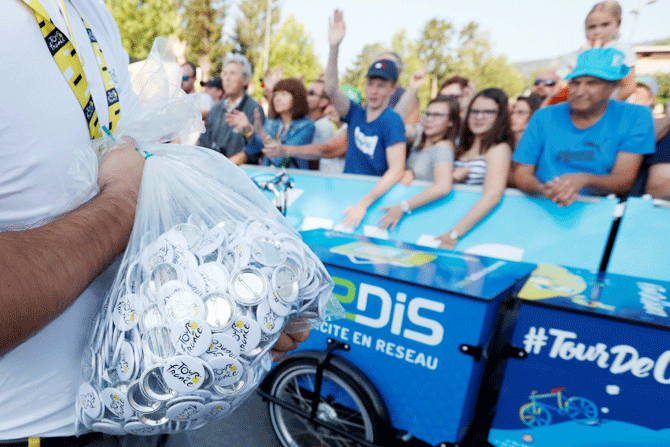Urge them to end 'avalanche of plastic'

The corporate "caravan" that motors across valleys and mountains ahead of the cyclists competing in the Tour de France has been a crowd-pleaser for decades, but ecologists want organisers to put an end to the avalanche of plastic it generates.
Every day of the Tour, the event's corporate sponsors cover the route in a column of open-backed trucks that stretches for kilometres, throwing out snacks, drinks, t-shirts, keyrings and other objects, many of them made or wrapped in plastic.
Organisers say that by the time this year's event ends on the Champs-Elysees boulevard in Paris on Sunday, 15 million freebies will have been tossed to the crowds.
They say that a few years ago it was 18 million, but the environmentalists says the "Tour de Plastic" has to do more.
"The giving away of 'goodies' has to be totally rethought. The ecological emergency demands action," Green party lawmaker Francois-Michel Lambert told Reuters.
Lambert is one of 30 legislators who, together with six charities including Zero Waste France and Surfrider Foundation Europe, wrote an open letter to the Tour's organisers calling for action.
Tour director Christian Prudhomme responded with a letter in the sports daily L'Equipe saying that sponsors now had to pledge to reduce plastic, and that items such as caps and t-shirts were being distributed without plastic wrapping.
Lambert said he would meet Prudhomme in September to discuss the 2020 Tour.
BAMBOO CUTLERY
The Tour's main caterer, Sodexo, says it is turning to disposable cutlery made of bamboo and containers made of cane and wood pulp.
"The reduction of single-use plastics is at the heart of our fight against waste," a spokeswoman said.
Single-use plastic items such as straws, cutlery and cotton buds will be banned in the European Union by 2021.
Activists are also targeting team sponsors, notably Ineos, which has taken over from Sky as sponsor of defending champion Geraint Thomas's team.
"We want people to know Ineos is associated with plastic, that Ineos is not a green company," Zero Waste France's Laura Chatel said.
Ineos spokesman Richard Longden said plastic was a valuable resource in making products ranging from blood bags to wind turbines.
"The real problem is plastic waste, and the disposable culture we all take for granted," he said.













 © 2025
© 2025